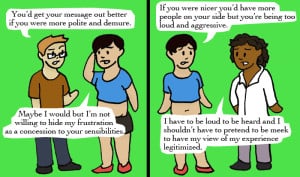
Source: WikiHow
Helping a friend or loved one through a difficult time can be tough. But opening up can be even tougher.
Whether it’s an everyday problem or a big life decision, turning to someone else for support and advice can feel uncomfortable and awkward.
On the flip side, listening and giving advice is equally tricky. What do you say? How do you help and encourage them without offending them?
Being tactful is especially important if the issue at hand is causing the person distress or if they’re hesitant to talk about it in the first place.
When you’re reaching out to someone and taking a risk by sharing your feelings, you don’t want to be misunderstood or brushed aside.
It’s important to be conscious of your words and actions.
In my experience, there are several responses that can come off as insensitive when someone is looking for support.
Of course, this article is only meant to address routine instances of sharing and communicating between family and friends.
If your loved one seems to be struggling or treats you as their walk-in psychologist, encourage them to seek professional help!
But let’s discuss the everyday phrases that might give the wrong impression to a friend in need.
1. ‘It’s Over Now’
Sometimes it’s important to remind your loved one that whatever is causing them pain is in the past.
At some point, beginning the healing process is what’s healthiest for them, rather than dwelling on what happened or what they could have changed.
However, this can also feel incredibly dismissive in the wrong context.
There’s an implicit “so why are you still talking about it?” at the end of this statement.
People tend to use the justification that it’s no longer an active situation to shut down the conversation and shoo away the other person.
Effectively, you’re signaling that you’d rather not listen to what they have to say because you don’t find it relevant – even if they do, which is what’s more important.
Just because something happened in the past doesn’t mean that you’re not allowed to have unresolved emotions. To suggest otherwise promotes unhealthy coping mechanisms.
It’s already something that’s bothering them. You’re only making them feel worse by saying that they don’t have a right to talk about it anymore.
Invalidating someone’s emotions leads to internalized shame.
If they suppress those emotions, they’re less likely to deal with their feelings in a healthy way the next time that a similar situation arises.
So, what are some better alternatives?
It’s ill-advised to prescribe generic phrases for so many potential situations, but in general, remind the person that it’s okay to feel self-doubt or anger. Don’t stigmatize negative emotions.
If they’re upset, don’t try to sweep their bad feelings under the rug or excessively emphasize the positive unless they ask you to do so.
Underscore that they’re being heard and that they don’t have to worry about your reaction to their feelings (unless the situation directly involves you, which is another matter entirely!).
2. ‘This Reminds Me of [Insert Personal, Unrelated Tangent]’
Gee, thanks for turning my heartfelt venting into a segue for you to talk about yourself!
If someone comes to you looking for advice or to talk about their problem, don’t make the conversation all about you, even if you’re trying to relate to them.
The other person shouldn’t have to spend the majority of the conversation listening to your story. That’s not what they’re there for.
Now, relationships involve a lot of give and take, I know that. But it’s important to know when to step back and listen to each other.
You can casually tell them anecdotes about your life whenever you like! Just be aware that times of personal crisis might not be the best option.
It doesn’t feel like you’re supportive or emotionally invested in what’s going on if you take every opportunity to bring the topic back to yourself.
If you’re stalling because you don’t feel like you know how to appropriately react to the situation, tell them that! Help them find someone else to talk to. It’s better than making both of you frustrated.
Otherwise, just remember that the focus should be completely on them and reassure them that it’s their time to talk.
3. ‘A Similar Situation Happened to Me, and I Turned Out Okay’
I understand that this one is usually said with good intentions. The sun will come out tomorrow, it’s always darkest before the dawn, there’s a light at the end of the tunnel, blah blah blah.
The problem is that it obscures the importance of your perspective in favor of a nebulous hypothetical.
You need to deal with the issues that affect you right now. It doesn’t matter that it’ll probably be okay eventually. What matters is that it isn’t okay right now.
Sometimes you just need to be validated in your right to feel shitty.
In a similar vein to #2, oftentimes this alleged empathy is just a springboard for the other person to tell a tale about how they themselves overcame adversity, with the justification being that they’ve determined that their situation is perfectly analogous to yours.
I don’t mean to say that there’s anything wrong with that train of thought if the person in need finds it beneficial! If that cheers you up or if you can take inspiration or advice from it, go for it.
However, it’s not cool if it’s used to marginalize the other person’s feelings. Again, it’s never a good idea to frame things in a way that pressures people into silence.
4. ‘Are You Sure It Wasn’t Something You Did?’
It can be difficult to see your loved ones upset. People are very uncomfortable with situations they can’t control.
As a result of that, many of us will compensate by reimagining the scenario in ways that give us the illusion of agency.
If we can think about the problem in terms of the person having enough control to impact the outcome, we feel less guilty about being unable to help or understand.
Ultimately, holding your loved one responsible for their own trauma doesn’t fix anything. It makes them feel attacked, as if you’re accusing them of creating their own problems.
You might want to make everything better, but letting them express themselves will do them far more good than pinpointing a source of their troubles.
With that said, don’t sugarcoat everything either.
Sometimes we are at fault for things that we don’t realize initially we’re too distracted by our emotions. Accountability for your own actions is important, but maybe hold off from pointing the finger right out of the gate.
5. Brief, One-Word Responses
Out of all the responses, I find the lack of one to be most irritating and oppressive.
Opting out of being a confidant is totally fine. Not everyone is good at emotional talks or listening or solving problems, and your loved one should accept that.
However, the other person is turning to you for support, and there’s a reason for that. Don’t offer to listen and then shut down or act like they’re inconveniencing you.
When you’re already down, the worst feeling you could possibly have is to feel like the one person you’re depending on for a sympathetic ear doesn’t care.
They need you, so talk to them.
Even if you can’t relate to what they’re going through, it will help just to have someone to hear their side of things.
***
Talking through emotions or helping someone problem solve can seem a bit daunting, but as long as you remain aware of the impact of your words, you can help your loved one to feel valued and, most importantly, remind them that their thoughts and feelings matter.
Want to discuss this further? Login to our online forum and start a post! If you’re not already registered as a forum user, please register first here.
Erin Tatum is a Contributing Writer at Everyday Feminism. She’s a feminist, queer theory lover, and television enthusiast living in Pennsylvania. She is particularly interested in examining the representation of marginalized identities in media. In addition to Everyday Feminism, she’s also a weekly contributor toBitch Flicks. Follow her on Twitter @ErinTatum91 and read her articles here.
Search our 3000+ articles!
Read our articles about:
Our online racial justice training
Used by hundreds of universities, non-profits, and businesses.
Click to learn more




















